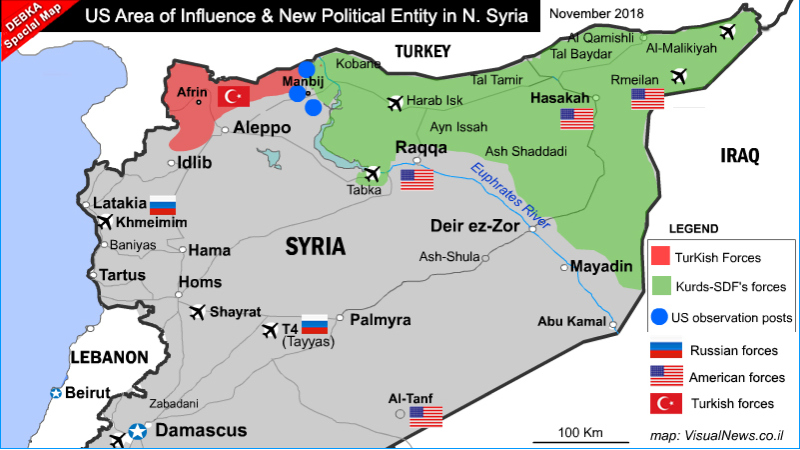US Marks out Area of Influence in NE Syria, Anchored in New Kurdish-Led Political Entity & Army
Amid recurring spats with Turkey, the US is forging ahead with a detailed road map for stabilizing its sphere of influence in northeastern Syria and anchoring it on a new army and a new autonomous political system formed by local Kurdish factions and other segments of the population.
Initial Turkish objections were reportedly settled, according to DEBKA Weekly’s exclusive sources, under a deal negotiated in Ankara by Ambassador James Jeffrey, Donald Trump’s special adviser on Syria. This deal is designed to open the door for the US to confirm its military and political domination of wide swaths of northern and eastern Syria, including the disputed Syrian-Iraqi border, and establish its first real counterweight to Russia’s military control of western Syria.
The six points of the deal provisionally struck with Ankara by Ambassador Jeffrey are revealed here for the first time:
- Turkey undertakes to halt its army’s advance into northeastern Syria, specifically the eastern bank of the River Euphrates and other Kurdish regions – a threat which figures repeatedly in President Tayyip Erdogan’s rhetoric.
- The leading Kurdish party’s political and military arms, PYD and PYG, have pledged to purge elements of the Turkish separatist PKK (Kurdish Workers’ Party) from its ranks under a US guarantee.
- The Kurds will forego their demand for the restoration of Afrin, the Syrian province seized by the Turkish army 10 months ago.
- A new Syrian-Kurdish army of 150,00 men under arms will be formed around the US-backed Syrian Democratic Force (SDF)’s core of 60,000 members.
- A new, autonomous Kurdish-Syrian government system will rise in northern Syria.
- US observation posts will define the borders of the new entity and monitor implementation of the deal with Turkey.
Those posts were initially a big bone of contention between Ankara and Washington. Turkish Defense Minister Hulusi Akar complained they would have a “very negative impact.” In another beef, he said, “We expect our US allies to immediately cut their ties with the terrorist YPG, who are not the slightest bit different from the PKK – the Kurdistan Workers Party.” If not, Ankara “will take the necessary steps.”
Last week, US Defense Secretary James Mattis tried explaining: “We are putting observation posts in several locations up along the northern Syrian border because we want to be the people who call the Turks and warn them if we see something coming out of an area that we’re operating in,” he said.
However, no word about the US plan or the deal with Ankara has yet found expression in the public statements of Turkish or Kurdish officials, most likely because of their deeply ingrained mutual distrust. Both are evidently watching to see how Washington upholds the scheme.
And indeed, on Saturday, Nov. 24, the first US observation posts went up on the Syrian-Turkish border, three at Tal Abyad and two others at Ain al-Arab, which US sources said would protect the Kurds in case Ankara changes its mind and goes on the offensive. A commander of the Kurdish YPG – the main component of the SDF – said this week that “coalition forces have already begun setting up three outposts in Gire Sipi and two others in Kobani, on the borders of Kurdish territories in North Syria.” One of the main goals of the US plan is to draw a line on Iran’s growing influence, said the commander. (See a separate article in this issue revealing Iran’s plan to build a Fordow-type installation in northern Syria.)
The US has also reportedly asked the Kurdish PYD to communicate with the Kurdish National Council Opposition and the Arab and Syrian opposition forces with a view to forming a new, autonomous political system in northeastern Syria. Washington is said to be interested in the new entity for stabilizing its area of influence, since “the US and western Allies plan to remain in the country for a longer period of time.”
As the US scheme takes shape, DEBKA Weekly’s sources note the fragile state of the deal with Ankara. As recently as Friday, Nov. 23, Turkish Foreign Minister Mevlut Cavusoglu said that the implementation of the roadmap in the east of the Euphrates “must witness the removal of units belonging to Syrian Kurdish Forces.” Turkey, at least publicly, holds to its animosity for the Kurds, despite the deal negotiated with Ambassador Jeffrey for a cross-border truce.


